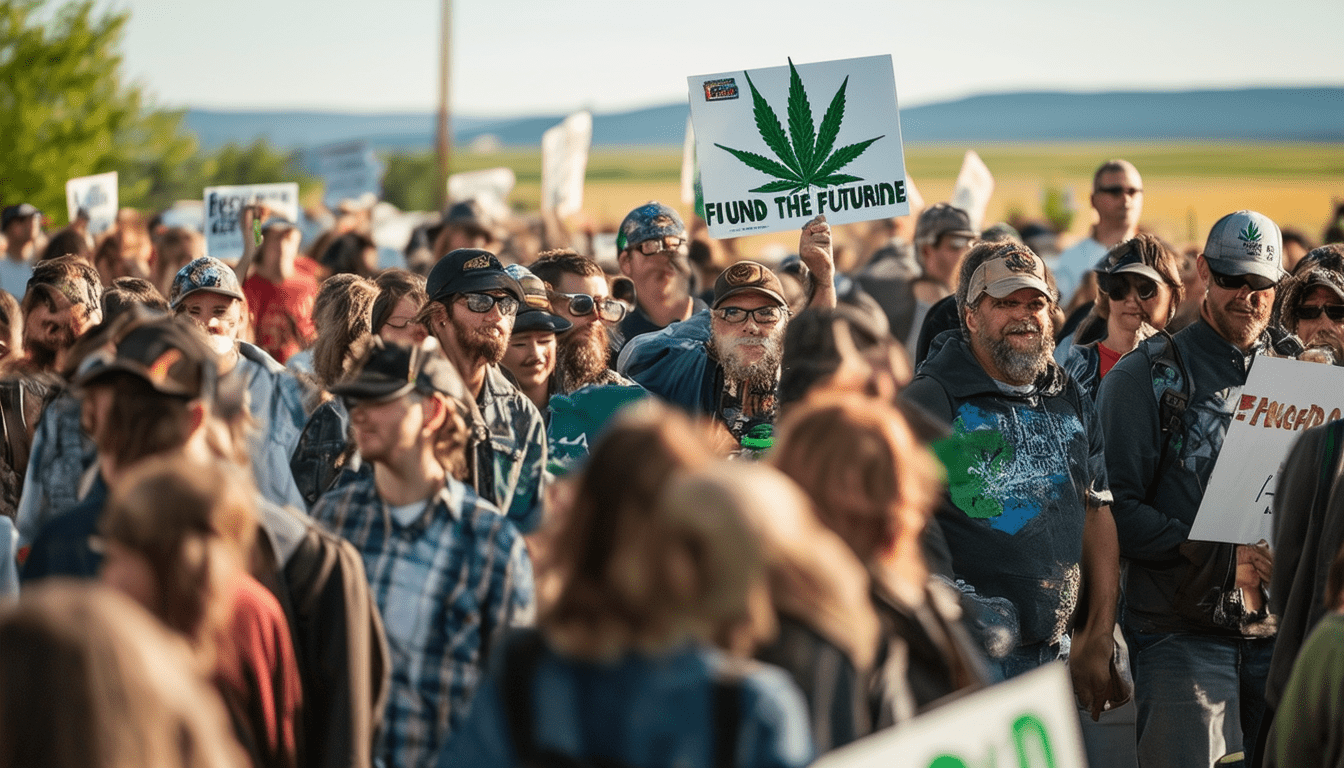Funding the Future: How South Dakota’s Marijuana Legalization Campaign is Backed by the Cannabis Industry
|
IN BRIEF
|
The ongoing struggle for marijuana legalization in South Dakota has drawn significant attention, not just from local voters but also from the broader cannabis industry. As the November ballot approaches, the financial dynamics behind the campaign reveal an intriguing narrative. With approximately $915,000 raised for and against the legalization measure, it is evident that the financial backing from the cannabis sector plays a pivotal role in shaping the outcome. This influx of funds highlights the critical intersection between public policy and industry interests, shedding light on how monetary contributions are influencing South Dakota’s legislative landscape regarding marijuana use.

The upcoming South Dakota ballot measure on marijuana legalization has ignited significant debate and draws considerable financial support from the cannabis industry. As the campaign gears up for the vote scheduled on November 5, an estimated $915,000 has been raised to influence the decision, reflecting the polarizing sentiments surrounding cannabis legislation. This article delves into the extensive funding landscape of the campaign, illustrating the potent role of the cannabis industry in shaping public policy.
The Financial Landscape of the Campaign
An analysis of recent campaign finance reports reveals that both proponents and opponents of the marijuana legalization measure, termed Initiated Measure 29, have nearly matched their fundraising efforts, each nearing the $460,000 mark. The high stakes of this battle underline the complex interplay of political and financial interests in South Dakota’s evolving cannabis landscape.
Financial Contributions from the Cannabis Sector
Since last spring, more than $300,000 has been contributed by representatives of the cannabis industry in support of the measure. Such contributions highlight not only the financial clout of this sector but also its commitment to advancing cannabis-related legislation. The pivotal financial support stems primarily from businesses with established interests in the legal marijuana space, including dispensaries and advocacy organizations focused on cannabis legalization.
Among the most notable contributions was a hefty $100,000 donation from GL Partners Inc., a medical marijuana dispensary based in Rapid City. This use of substantial financial resources from the cannabis industry illustrates a concerted effort to steer public opinion and ballot outcomes in favor of marijuana legalization.
Opposition Funding: A Strong Contradiction
On the other side of the argument, an anti-marijuana faction has also made significant strides in fundraising, gathering over $457,000. This figure includes more than $370,000 from individual donors, demonstrating how grassroots contributions can influence legislative measures. Prominent figures, such as Brad Wheeler and Robert Mudge, made substantial personal donations, emphasizing the commitment of opponents to maintaining strict cannabis regulations in the state.
Corporate and Organizational Backing
In addition to individual contributions, the anti-marijuana lobby benefitted from substantial support from local businesses, including $25,000 donations from entities like First PREMIER Bank. This corporate backing illustrates a strategic alliance among local businesses who perceive potential economic risks associated with marijuana legalization. The coalition of businesses actively opposing the measure reflects a strong community sentiment rooted in concerns over public health and safety.
Strategic Use of Funds: Campaign Operations
Both the pro and con campaigns have demonstrated strategic allocation of their funds. For instance, the Yes on 29 Ballot Committee has reported spending approximately $217,000 to promote the legalization of marijuana. This spending encompasses marketing, outreach, and educational campaigns aimed at informing voters about the benefits of legalization, which includes the potential for increased tax revenue and economic development opportunities.
Conversely, the Protecting SD Kids Ballot Question Committee, responsible for opposing the measure, has focused its resources on disseminating information that emphasizes the perceived risks associated with legalized marijuana use, such as impacts on youth and community health.
The Road Ahead for South Dakota’s Cannabis Legislation
The road ahead for cannabis legislation in South Dakota is fraught with tension, as both sides mobilize their financial and human resources to sway voter sentiment leading up to the election. With such substantial sums being raised and spent, the role of the cannabis industry in the legalization discourse cannot be understated.
As voters approach the November 5 ballot, understanding the financial dynamics at play will be critical in evaluating the societal implications of the possible legalization. The intersection of political funding, public opinion, and the future of cannabis legislation in South Dakota will continue to evolve as the situation unfolds.
Comparison of Funding Sources for South Dakota’s Marijuana Legalization Campaign
| Funding Source | Details |
| Cannabis Industry Contributions | Over $300,000 raised since spring, highlighting strong support from industry players. |
| Total Funds Raised | Approximately $915,000 for and against legalization, indicating significant financial interest. |
| Supporting Committee Expenditure | The Yes on 29 Ballot Committee spent $217,000 on campaign activities. |
| Largest Single Contribution (Pro) | $100,000 from GL Partners Inc., a key player in the medical marijuana market. |
| Opposition Contributions | The anti-marijuana side raised over $457,000, showing organized resistance. |
| Major Anti-Marijuana Donor | Brad Wheeler contributed $61,400, representing significant individual opposition funding. |
| Total Expenditure by Opposition | The Protecting SD Kids Ballot Committee spent $371,000 to combat the measure. |
| Impact of Contributions | The lack of limits on contributions has led to intensified financial backing from both sides. |

The upcoming November ballot measure in South Dakota, which aims to legalize a limited form of adult marijuana use, has attracted substantial financial backing, primarily from the cannabis industry. With around $915,000 raised collectively for and against the measure, the campaign exemplifies the dedicated push for marijuana reform in the state. This article explores the financial dynamics at play and the implications for South Dakota’s future regarding cannabis legalization.
Financial Overview of the Campaign
According to campaign finance reports, a significant portion of the funding, over $300,000, has come from representatives within the cannabis industry since last spring. As proponents rally behind Initiated Measure 29, which would allow adults aged 21 and older to possess and use up to 2 ounces of marijuana, it’s clear that the financial stakes are high. In contrast, anti-marijuana advocates raised slightly less, totaling $457,000, showcasing a nearly split financial engagement from both sides.
Support from the Cannabis Industry
The Yes on 29 Ballot Committee has reported raising approximately $436,000 and has utilized around $217,000 since May, aiding the campaign in its materials and outreach efforts. Contributions from the cannabis sector have significantly influenced this fundraising effort, with the largest single donation being $100,000 from GL Partners Inc., a business operating a medical marijuana dispensary in Rapid City. Other noteworthy contributions come from family-owned businesses and national organizations advocating for legalization.
Opposition Funding Dynamics
On the other side of the spectrum, the Protecting SD Kids Ballot Question Committee has raised over $457,000 and spent about $371,000 in its efforts against the measure. Prominent individual donations, such as $61,400 from businessman Brad Wheeler, have highlighted the concentrated financial backing that anti-marijuana advocates enjoy. Furthermore, substantial contributions have been received from various South Dakota companies, evidencing the broader community’s involvement in shaping the legislative outcome.
Conclusions and the Coming Vote
As South Dakotans prepare to cast their votes on November 5, the influx of financial support from the cannabis sector amplifies the message of legalization advocates. With substantial funds backing the campaign and growing public interest in marijuana reform, the outcome of Initiated Measure 29 could set a significant precedent not only in South Dakota but across the nation.
For more insights on state-level cannabis legislation and public opinion on marijuana legalization, reports indicate a consistent trend of increasing support across various demographics, as seen in other states like Kansas. This evolving support landscape will undoubtedly influence future legislative efforts nationwide.
Funding Dynamics of South Dakota’s Marijuana Legalization Campaign
- Total Funding: Approximately $915,000 raised for and against the measure.
- Pro-Measure Contributions: $458,000 in support of legalization.
- Anti-Measure Contributions: $457,000 against legalization efforts.
- Cannabis Industry’s Role: Over $300,000 contributed by industry representatives.
- Notable Contributions: $100,000 from GL Partners, a medical marijuana dispensary.
- Key Donors: Brad Wheeler ($61,400) and Robert Mudge ($50,000) opposing legalization.
- Committee Spending: Pro campaign spent $217,000 of its funds; anti campaign spent $371,000.
- Individual Donor Impact: More than 100 individuals contributed over $370,000 against the measure.
- Additional Support: Fundraising from other organizations, including a $37,000 contribution from the Marijuana Policy Project.
- Financial Transparency: No limits on contributions to ballot question committees.
Funding the Future: Understanding Financial Backing in Marijuana Legalization
The financial landscape of South Dakota’s marijuana legalization campaign, specifically Initiated Measure 29, reveals a significant influence from the cannabis industry. With approximately $915,000 raised for and against the measure, the funding sources raise questions about the motivations behind such financial commitments. Of this sum, over $300,000 was contributed by entities within the cannabis sector, highlighting the industry’s vested interest in the legalization efforts. This article delves into the implications of this funding and offers recommendations for navigating the ongoing debate over marijuana legislation in South Dakota.
The Role of the Cannabis Industry
As the primary source of funding, the cannabis industry plays a crucial role in shaping the campaign’s narrative. The support amounting to over $300,000 underscores a strong belief among industry stakeholders that legalizing marijuana could lead to substantial market opportunities. However, this support brings with it concerns regarding the influence of corporate interests over public opinion and the legislative process. It is essential to recognize that while financial contributions can enhance campaign efforts, they also risk skewing the discussion towards profit-driven motives rather than public health and welfare.
Transparency in Contributions
To foster trust and public support, it is vital that the financing of these initiatives remains transparent. Increased visibility into who is backing the measure can help dispel fears of undue influence. Campaigns should create accessible reports detailing contributions and expenditures. This transparency allows the electorate to make informed choices regarding the implications of cannabis legalization and its funding sources. By prioritizing openness, the campaign can enhance its credibility and demonstrate that its motivations align with the public’s interests.
The Impact of Opposition Funding
On the opposing side, more than $457,000 has been raised with significant contributions from local businesses and individual donors opposed to the legalization measure. The largest single donation of $61,400 from a local entrepreneur points to the grassroots nature of the opposition. This divide in funding reflects competing visions for the state’s future. Understanding these perspectives and fostering constructive dialogue between both sides can lead to more balanced and rounded legislative discussions. Rather than viewing each other as adversaries, stakeholders should engage in meaningful conversations about the potential implications of legalized marijuana.
Encouraging Diverse Voices
It is crucial to ensure that all voices are heard in the ongoing debate surrounding cannabis legislation. The funding sources heavily favor large contributors, potentially sidelining smaller community interests and concerns. Efforts should be made to encourage local advocacy groups and residents to participate actively in the discourse. Grassroots initiatives, forums, and public discussions could empower citizens to voice their opinions and experiences with marijuana use and its societal implications. This inclusive approach not only democratizes the conversation but also enriches the quality of the debate.
The Path Forward
The path toward cannabis legalization in South Dakota hinges on effective campaign strategies and community engagement. By promoting greater transparency, encouraging diverse voices, and fostering constructive dialogue, the campaign can shift the focus from financial backing to the real impact of legalization on society. It is paramount for the electorate to assess both sides of the funding arguments critically, ensuring that the ultimate decision regarding marijuana legislation is based on well-rounded information, rather than purely financial influences.
As South Dakota prepares for this pivotal moment, understanding the dynamics of funding and its implications remains essential. By embracing recommendations aimed at fostering transparency and inclusivity, stakeholders can help guide the campaign toward a more informed and responsible approach to marijuana legalization.





Post Comment